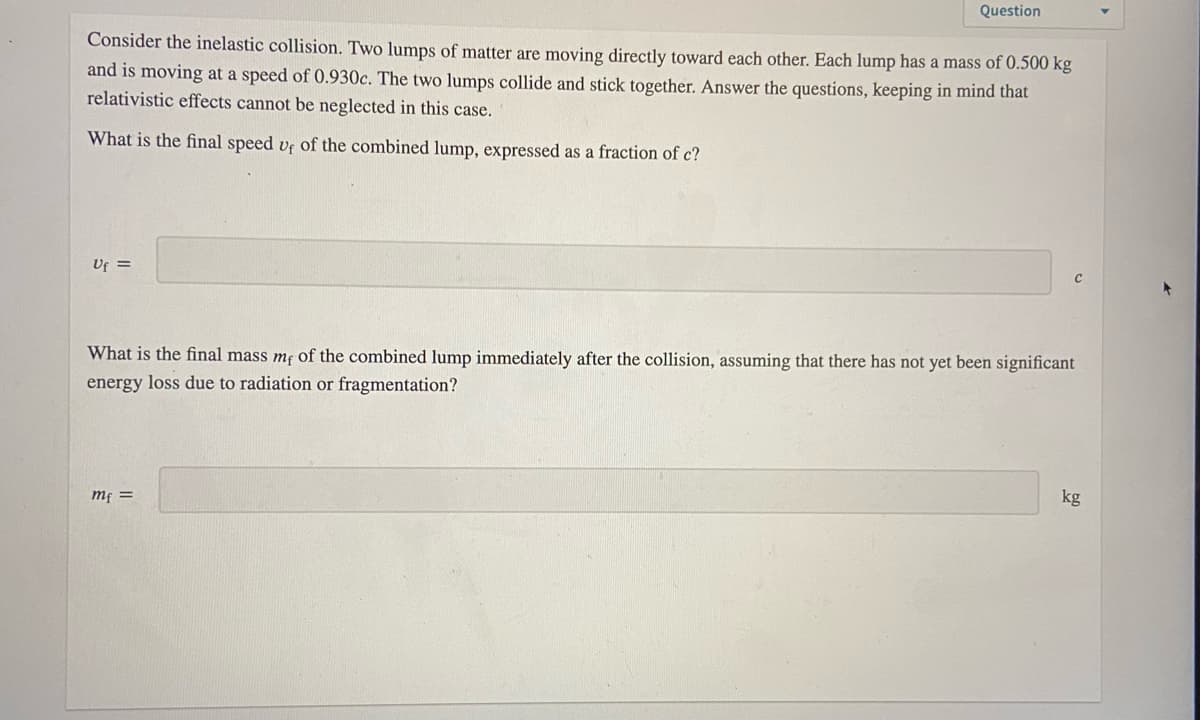Question Consider the inelastic collision. Two lumps of matter are moving directly toward each other. Each lump has a mass of 0.500 kg and is moving at a speed of 0.930c. The two lumps collide and stick together. Answer the questions, keeping in mind that relativistic effects cannot be neglected in this case. What is the final speed vf of the combined lump, expressed as a fraction of c? Uf = What is the final mass mf of the combined lump immediately after the collision, assuming that there has not yet been significant energy loss due to radiation or fragmentation? kg mf =
Question Consider the inelastic collision. Two lumps of matter are moving directly toward each other. Each lump has a mass of 0.500 kg and is moving at a speed of 0.930c. The two lumps collide and stick together. Answer the questions, keeping in mind that relativistic effects cannot be neglected in this case. What is the final speed vf of the combined lump, expressed as a fraction of c? Uf = What is the final mass mf of the combined lump immediately after the collision, assuming that there has not yet been significant energy loss due to radiation or fragmentation? kg mf =
Modern Physics
3rd Edition
ISBN:9781111794378
Author:Raymond A. Serway, Clement J. Moses, Curt A. Moyer
Publisher:Raymond A. Serway, Clement J. Moses, Curt A. Moyer
Chapter1: Relativity I
Section: Chapter Questions
Problem 13P: The muon is an unstable particle that spontaneously decays into an electron and two neutrinos. If...
Related questions
Question

Transcribed Image Text:Question
Consider the inelastic collision. Two lumps of matter are moving directly toward each other. Each lump has a mass of 0.500 kg
and is moving at a speed of 0.930c. The two lumps collide and stick together. Answer the questions, keeping in mind that
relativistic effects cannot be neglected in this case.
What is the final speed vf of the combined lump, expressed as a fraction of c?
Uf =
What is the final mass mf of the combined lump immediately after the collision, assuming that there has not yet been significant
energy loss due to radiation or fragmentation?
mf =
kg
Expert Solution
This question has been solved!
Explore an expertly crafted, step-by-step solution for a thorough understanding of key concepts.
This is a popular solution!
Trending now
This is a popular solution!
Step by step
Solved in 3 steps with 3 images

Knowledge Booster
Learn more about
Need a deep-dive on the concept behind this application? Look no further. Learn more about this topic, physics and related others by exploring similar questions and additional content below.Recommended textbooks for you

Modern Physics
Physics
ISBN:
9781111794378
Author:
Raymond A. Serway, Clement J. Moses, Curt A. Moyer
Publisher:
Cengage Learning

University Physics Volume 3
Physics
ISBN:
9781938168185
Author:
William Moebs, Jeff Sanny
Publisher:
OpenStax

Physics for Scientists and Engineers: Foundations…
Physics
ISBN:
9781133939146
Author:
Katz, Debora M.
Publisher:
Cengage Learning

Modern Physics
Physics
ISBN:
9781111794378
Author:
Raymond A. Serway, Clement J. Moses, Curt A. Moyer
Publisher:
Cengage Learning

University Physics Volume 3
Physics
ISBN:
9781938168185
Author:
William Moebs, Jeff Sanny
Publisher:
OpenStax

Physics for Scientists and Engineers: Foundations…
Physics
ISBN:
9781133939146
Author:
Katz, Debora M.
Publisher:
Cengage Learning

College Physics
Physics
ISBN:
9781938168000
Author:
Paul Peter Urone, Roger Hinrichs
Publisher:
OpenStax College

Astronomy
Physics
ISBN:
9781938168284
Author:
Andrew Fraknoi; David Morrison; Sidney C. Wolff
Publisher:
OpenStax
